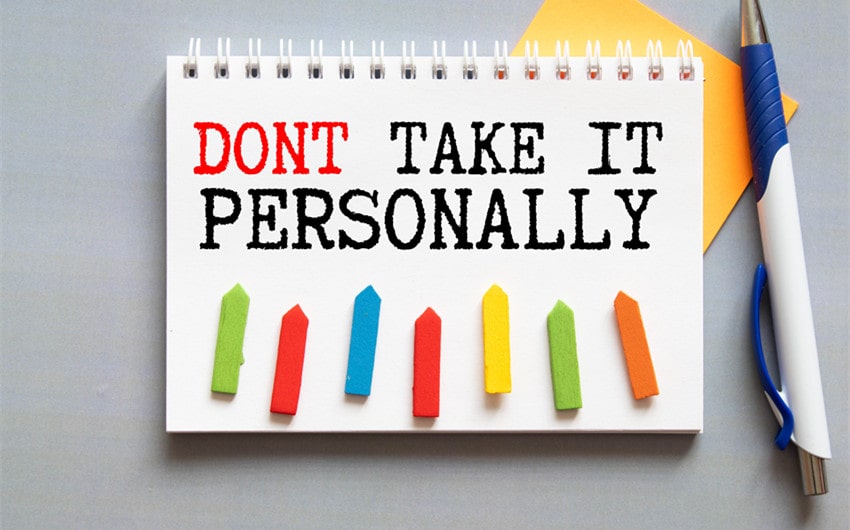6 Effective Strategies on How to Not Take Things Personally
We’ve all been there—feeling hurt or upset by something someone said or did, even when it wasn’t meant to be personal. Learning how to not take things personally can be a game-changer for your emotional well-being and relationships.
It’s about understanding that other people’s actions often reflect their own struggles, not your worth. In this article, you’ll discover practical steps to manage your reactions and build emotional resilience, helping you feel more confident and less affected by external negativity.
Recognizing When You’re Taking Things Personally

The first step in learning how to not take things personally is to recognize when it’s happening. Often, we internalize others’ comments or behaviors without realizing it, leading to emotional distress, overthinking, or even conflict. Developing self-awareness around these moments helps you identify patterns in your reactions and begin to manage them more effectively. Here are some common signs that you may be taking things personally:
1. Overanalyzing Conversations or Situations
One of the clearest signs that you’re taking something personally is overanalyzing a comment, action, or situation. If you find yourself replaying a conversation in your head, dissecting every word, tone, or gesture, you might be taking it more personally than intended. This can lead to unnecessary stress and anxiety as you attempt to find hidden meanings or assume the worst about what someone said or did.
Examples of overanalyzing:
- Repeatedly thinking, “What did they mean by that?” after a casual remark.
- Searching for negative intent or criticism in someone’s neutral comment.
- Dwelling on small details in a conversation long after it has ended.
Overanalyzing can make minor situations seem much bigger than they are, leading to unnecessary emotional turmoil.
2. Feeling Defensive or Hurt Easily
If you frequently feel defensive or emotionally wounded by others’ words or actions, it may be a sign that you’re taking things personally. This could happen in everyday interactions where no harm is intended, but the sensitivity to perceived criticism makes you react strongly. When you interpret even neutral or constructive feedback as a personal attack, it’s an indication that you’re internalizing external comments too much.
Examples of feeling defensive:
- Getting upset when someone offers suggestions or feedback, assuming they are being critical.
- Reacting emotionally to a partner, friend, or co-worker’s comment, even when it’s not aimed at you.
- Assuming someone’s casual or offhand remark was meant to criticize or undermine you.
Feeling defensive can create conflict and strain relationships, as others may not realize that their words are being taken so personally.
3. Taking Neutral or Unrelated Actions as Personal Attacks
Sometimes, we interpret neutral or unrelated actions by others as being directed at us, even when they have nothing to do with us. This is especially common when we are feeling insecure or vulnerable. For example, if someone cancels plans, you might assume it’s because they don’t want to spend time with you, rather than considering other possible reasons, like their own schedule or personal issues.
Examples of misinterpreting neutral actions:
- Assuming someone’s quietness or distance is because they’re upset with you, even if they might just be having a bad day.
- Believing a friend’s canceled plans are a reflection of your importance to them, rather than considering other possible reasons.
- Thinking that a colleague’s decision to disagree with you in a meeting means they don’t respect your ideas.
In these cases, you’re taking responsibility for things that are likely unrelated to you, which can lead to feelings of rejection or hurt.
4. Constantly Seeking Validation or Reassurance
Another sign that you’re taking things personally is the frequent need for validation or reassurance from others. If you often feel the need to ask others if they’re upset with you or if they still value your relationship, it could be a reflection of internalizing external actions or words. Constantly seeking reassurance can become emotionally draining for both you and the people around you.
Examples of seeking validation:
- Regularly asking a partner or friend if they’re mad at you, even when there’s no indication of a problem.
- Needing constant confirmation that others appreciate or care for you after minor conflicts or disagreements.
- Feeling uneasy or anxious if you don’t receive immediate positive feedback after a conversation or interaction.
While it’s natural to want affirmation from others occasionally, constantly seeking validation can indicate that you’re taking things more personally than necessary.
5. Struggling to Let Go of Minor Conflicts
If you find it difficult to move on from small disagreements or misunderstandings, that could be a sign of taking things personally. Holding onto minor issues and letting them fester can create a larger emotional response than the situation warrants. People who take things personally may replay conflicts over and over in their minds, allowing the emotions to linger long after the issue has been resolved.
Examples of holding onto conflicts:
- Dwelling on a minor argument with a friend or partner for days, even if it was resolved.
- Feeling like every conflict is a reflection of a deeper problem with the relationship.
- Letting small issues trigger strong emotional responses that affect your mood for extended periods.
Learning to recognize when you’re holding onto small conflicts can help you let go and avoid unnecessary stress.
Steps to Not Taking Things Personally

Learning how to not take things personally can have a profound impact on your emotional well-being and your relationships. It’s about shifting your mindset, gaining control over your emotional reactions, and realizing that not everything is about you. By following these practical steps, you can build resilience and learn to navigate life’s challenges without internalizing every comment, action, or situation.
1. Understand It’s Not Always About You
One of the most important realizations in not taking things personally is understanding that other people’s reactions, moods, and behaviors are often reflections of their own experiences, emotions, and circumstances, rather than a direct commentary on you. This perspective helps to detach yourself from the need to internalize everything as a personal judgment.
How to practice this:
- When someone says something hurtful, pause and ask yourself: “Is this about me, or could they be dealing with something in their own life?”
- Recognize that people’s moods and reactions can be influenced by stress, frustration, or other personal struggles, which may have nothing to do with you.
- Avoid assuming that someone’s bad mood or distant behavior is a reflection of your actions.
By separating your self-worth from other people’s reactions, you’ll be less likely to take things personally.
2. Practice Emotional Detachment
Emotional detachment doesn’t mean ignoring your feelings or becoming indifferent; it’s about creating some emotional distance between yourself and the situation at hand. This allows you to assess the situation more objectively rather than reacting immediately out of hurt or insecurity.
How to create emotional distance:
- Take a deep breath before responding to a comment or action that upsets you. This simple pause gives you time to process your feelings and avoid a knee-jerk reaction.
- Remind yourself that your immediate emotional response doesn’t define the situation. Just because you feel hurt doesn’t necessarily mean the other person intended to hurt you.
- Practice mindfulness techniques, such as deep breathing or meditation, to stay present and reduce emotional reactivity.
Emotional detachment allows you to view situations with a clearer, calmer perspective, which helps you not take things as personally.
3. Develop Empathy for Others
Cultivating empathy helps you understand that everyone has their own struggles, insecurities, and reasons for behaving the way they do. When you can put yourself in someone else’s shoes, it becomes easier to see that their words or actions may not be directed at you, but rather a reflection of their own inner world.
How to build empathy:
- Instead of immediately assuming bad intentions, ask yourself, “What might they be going through that led them to act this way?”
- Acknowledge that other people’s behavior may stem from stress, insecurity, or personal difficulties. For instance, a co-worker’s short response may be due to a stressful project, not your performance.
- Respond to negativity with compassion, even if it’s difficult. For example, if a friend seems distant, consider that they may be going through something and offer support rather than feeling rejected.
Empathy helps you separate your emotions from others’ actions, allowing you to respond with understanding rather than taking it personally.
4. Build Confidence and Self-Esteem
People who take things personally often have lower self-esteem or insecurities that make them more sensitive to others’ opinions or comments. By building your confidence and self-worth, you become less reliant on external validation and less reactive to perceived criticism or negativity.
Ways to build self-esteem:
- Celebrate your strengths: Make a habit of acknowledging your accomplishments, skills, and positive qualities. This reinforces your sense of self-worth, making you less likely to be shaken by outside comments.
- Engage in activities that make you feel capable and confident: Whether it’s pursuing a hobby, setting goals, or taking on challenges at work, building confidence through action can boost your self-esteem.
- Challenge negative self-talk: When you catch yourself thinking things like, “They must not like me” or “I’m not good enough,” actively replace those thoughts with more positive affirmations like, “I am valuable, regardless of what others think.”
When you have a strong sense of self, you are less dependent on others for validation and less likely to take things personally.
5. Don’t Jump to Conclusions
One of the biggest mistakes people make when they take things personally is jumping to conclusions about what someone else meant by their words or actions. It’s easy to assume the worst, but often, our interpretations are clouded by our own insecurities or fears. Avoiding these assumptions can save you a lot of unnecessary emotional pain.
How to avoid jumping to conclusions:
- Ask for clarity: If you’re unsure about someone’s intent, don’t be afraid to ask. For example, “When you said X earlier, did you mean Y, or did I misunderstand?”
- Give the benefit of the doubt: Instead of assuming a negative motive, give people the benefit of the doubt. Maybe they didn’t realize their words would hurt you, or maybe they weren’t even directed at you.
- Take a step back: Before reacting, ask yourself, “Is there another possible explanation for what they said or did?” Often, there are multiple ways to interpret a situation.
By avoiding assumptions, you give yourself the chance to understand the true nature of the situation, which helps prevent you from taking it personally.
6. Ask for Clarification
If you’re uncertain about the intent behind someone’s words or actions, asking for clarification can help prevent miscommunication and reduce the likelihood of taking things personally. Instead of ruminating or jumping to conclusions, simply seek clarity in a calm and non-confrontational manner.
Tips for asking for clarification:
- Use a neutral, non-accusatory tone when seeking clarification. For example, “I wasn’t sure what you meant earlier when you said X. Can you clarify?”
- Approach the conversation with curiosity rather than defensiveness. This opens up dialogue and allows the other person to explain without feeling attacked.
- Focus on understanding rather than blaming. The goal is to clear up any misunderstandings, not to assign fault.
Asking for clarification not only helps you avoid unnecessary hurt but also fosters healthier communication and understanding in your relationships.







